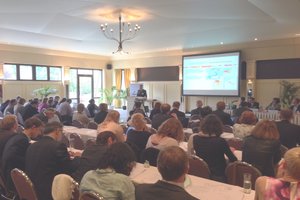News
Identifying the obstacles to cross-border cooperation
May 2015
With a view to its presidency of the EU Council in the second half of 2015, the Grand-Duchy of Luxembourg has placed the clearing of obstacles to cross-border cooperation at the centre of its priorities. A member of the MOT, the Grand-Duchy commissioned it to provide assistance, generating input for one of three technical seminars which took place on 19 May 2015 in Luxembourg City in preparation of its presidency. The MOT analysis is online.
On the basis of the responses to a questionnaire sent to entities involved in cross-border cooperation throughout Europe, the MOT produced an analysis of the legal obstacles preventing or threatening the implementation of cross-border projects, along with potential solutions that might involve the introduction of a new European legal instrument.
These results, and the work of the cross-border strategic committee on observation, were presented at the seminar on 19 May, stressing the importance of observation as a prior condition for the clearing of obstacles.
Some examples of obstacles highlighted by the survey:
With regard to health, one obstacle is the difficulty for patients to obtain easy access to care in a cross-border territory, with complex administrative procedures for the patients and for the healthcare professionals, as well as national healthcare provision planning instruments which stop at the borders. As this difficulty has been to a large extent overcome on the French-Belgian border thanks to an outline agreement between the two countries establishing ZOASTs (organised areas for access to cross-border healthcare), a proposal to make similar partnerships possible through a European regulation is put forward.
Another potential version of such a regulation could be the facilitation of agreements between States in response to local initiatives, to secure the legal framework applicable to a specific cross-border project. Examples given of the needs for such legal security include in particular French doctors made available to the EGTC Hôpital de Cerdagne, governed by Spanish law, the penal liability of whom remains unclear, and the case of an Interreg project which has trained a French-British cross-border firefighting team for dealing with fires at sea in the Dover Strait, without giving its members the legal possibility of intervening in the territorial waters of the other country. Similarly, the towns of Valga and Valka, on the Estonian-Latvian border, want to have the same legal framework for their cross-border town. Although these questions can be settled by an intergovernmental agreement that has then to be ratified, a European instrument would shorten the time necessary for implementing such an agreement, while leaving the initiative directly to the local authorities concerned, under the control of the Member States concerned.
Another point covered concerns the outermost regions of the European Union. Many of these regions have land or sea borders with countries which have levels of development that prevent them from attaining European standards, making movement of goods difficult. To facilitate their economic development, a version of the proposed new legal instrument would allow European standards to be relaxed when a cross-border development project is set up.
At the request of the Grand-Duchy, the MOT will also provide technical support during the Luxemburg presidency, in order to outline the scope of this new European instrument for making it easier to overcome legal obstacles to cross-border cooperation.
Read the MOT analysis.
More info on the seminar of 19th May.

